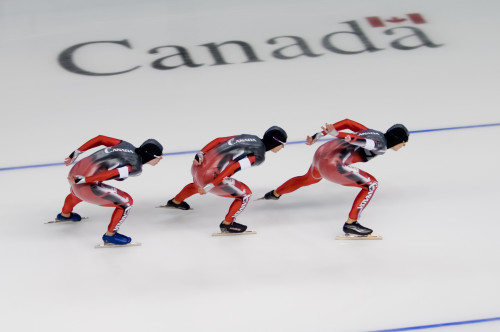Speed Skating Daily: Team Pursuit Preliminaries
The ladies’ 5000m was without incident nor any significant surprises (which itself is a bit of a surprise at these games). The favorite – Czech Martina Sablikova won, but after exhausting herself in trying to stay ahead of the pace set by German 21-year-old Stephanie Beckert which was extraordinary to say the least, taking entire seconds off the track record. The bronze medal was won by host country hero and opening ceremony flag-bearer Clara Hughes who became one of Canada’s most decorated olympians with 6 medals – two from summer games (cycling) and four from winter games (speed skating).
The upcoming team pursuit races are only preliminaries, but should be interesting to watch nevertheless. During the world cup season prior to the games, the teams raced each other in a time-trial fashion (like everything else in long track) in order to obtain the highest possible ranking. The top eight qualify for the Olympic games, where unlike in the world cups, the positions are determined by a knockout tournament. This raises the possibility that the best strategy in a race (especially in the quarter finals) is NOT to cover the distance as fast as one possibly can, which is very unusual for long track.
To be good at the team pursuit requires much more than having the three fastest skaters. Team cohesion is also very important. The pursuit draws on skills which are not often well-developed in long track skaters, such as having to skate well in a pack and being able to change the lead skater smoothly and with the minimum expenditure of effort. The ability to skate well behind another skater and get the maximum benefit from the aerodynamic advantage of not having to lead can be crucial. These are skills that are well developed in short track and inline speed skaters, so expect teams made up of crossover athletes to do well.
The favorite for the men is the Netherlands, and on paper it seems that they should be impossible to beat. Sven Kramer will also be hungry for redemption after his devastating disqualification. They are, however, not invincible because they, more than most teams, lack the kind of team cohesion that many other teams actively try to foster. Other challengers include Canada, and the USA. Curiously, the US team did not field Shani Davis to go with Chad Hedrick and Trevor Marsicano, which, one would think, would be something of a “dream team”. Last year’s world champions, Sweden, will need a miracle to make it through, as they are paired with the dutch in the quarterfinals.
The ladies are a similar story with team Canada coming in as heavy favorites, having set a world record in Calgary just last December. The race for the silver will be interesting as Japan, Germany, Russia and the Netherlands are all very strong. In fact, in the Salt Lake City world cup, the last one before the olympics, second, third, and fourth were only separated by a hundredth of a second. The Netherlands has also been suffering from some internal politics and may not end up starting with their strongest 3 skaters which could impede their progress to the final.
Also to think about – each team is allowed to name a squad of four skaters, while only three have to skate (the time is taken from the third skater). This means that the team in the preliminaries may differ from the team in the final. In an effort to “save” skaters for the final, it may be that a slightly slower team doesn’t make it through because they tried to save themselves for a final.


Leave a comment